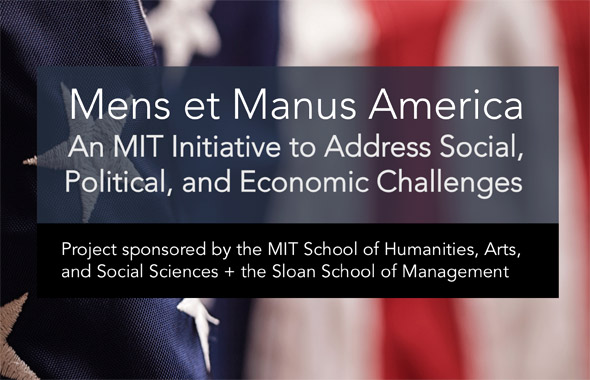Mens et Manus America initiative launches with documentary event
200+ students and faculty attend kickoff as SHASS and Sloan begin a research-based exploration of current U.S. social, political, economic challenges.
"This initaitive is something that is right at the heart of what MIT stands for," said Professor Thomas Kochan, who served as moderator for the launch event. "We believe in solving important problems, contributing collectively wherever we can."
Mens et Manus America, a new non-partisan initiative focused on examining social, political, and economic issues exposed by the 2016 presidential election, drew more than 200 attendees for its inaugural event on February 16 — a screening and discussion of "Exit Zero: An Industrial Family Story," a film documentary on deindustrialization in the U.S.
"This is the first in a series of events bringing local and non-local social science research to bear on issues of day," said Professor Ezra Zuckerman Sivan, deputy dean of the MIT Sloan School of Management and co-organizer of the initiative, which was launched jointly by Sloan and the MIT School of Humanities, Arts, and Social Sciences (MIT SHASS).
"Whatever your political leaning, it's clear that this is a time of change, and there's a question of what the role of a place like MIT is at a time like this," said co-organizer Professor Agustín Rayo, associate dean of SHASS. "I put it to you that part of that role is to understand these changes. Mens et Manus America will draw on the expertise of MIT faculty, and of researchers across the country, to bring that understanding to our community.”
Because social science research provides a rigorous method for illuminating social, political, and economic realities, the initiative will tap experts in these fields to help the MIT community comprehend and address some of today's most pressing issues, Zuckerman Sivan said. "It seems the responsibility of a major research institution to provide some guidance, resources, and tools to respond to events," he said.
"This initiative is something that is right at the heart of what MIT stands for," said Thomas Kochan, the George Maverick Bunker Professor of Management, who served as moderator for the launch event. "We believe in solving important problems, contributing collectively wherever we can."
The "Exit Zero" documentary
Following introductory remarks by the Mens et Manus America organizers, the bulk of the evening at Wong Auditorium was devoted to a screening of "Exit Zero," a documentary that details the personal and societal ripple effects resulting from the shutdown of Chicago's steel mills beginning in the early 1980s.
"The "Exit Zero" documentary, made by filmmaker Chris Boebel and MIT cultural anthropologist Christine Walley. whose father was left jobless by the closings, explores some of the root causes of the shutdowns and reveals the steel industry's complex impacts on the Walley family, their South Side Chicago neighborhood, and the environment.
And, as MIT News reported in 2013, "While the steel industry is a notable sector in which American industry has downsized, the same issue has been borne out in many areas of manufacturing and many parts of the country.”
“If you really want to understand why there is this expanding class inequality in the United States,” Walley observes, “one of the places you have to look is the long-term impact of deindustrialization. We have to think historically about how we got into this position — and how we can come out of it.”
“If we really want to understand why there is this expanding class inequality in the United States, one of the places we have to look is the long-term impact of deindustrialization. We have to think historically about how we got into this position and how we can come out of it.”
— Christine Walley, MIT Professor of Anthropology
What is the role of policy in a globalized economy?
"This is a really rich documentary and a very personal story that many of us from similar areas can relate to," said Kochan, who opened the floor for discussion after the film by inviting audience members to comment on what insights the documentary offers for navigating today's political landscape.
One audience member suggested that the film reveals some antecedents of the deep distress and anger laid bare during the 2016 campaign. "We all think something happened in November," he said, referencing the presidential election. "But this is a story that began in 1980 and before that, and we've been paying no attention to it."
Another person remarked to the filmmakers, who were both on hand for the discussion, "I'm left with the question asked at the beginning of the film — if deindustrialization was inevitable or something we could control."
Noting that the "Exit Zero" film revealed that the mill owner’s CEO has the highest salary in the nation at the time the company shut the factory, an audience member asked: What role did the corporation play in the mill’s closing?”
In her 2013 book, Exit Zero: Family and Class in Postindustrial Chicago, Walley describes how “rapid deindustrialization in the United States was not simply the result of seemingly inevitable shifts in the global economy, but a consequence of policy, and a new emphasis on raising short-term share prices, that pitted the interests of management against the long-term interests of companies and their workers.”
Who benefits?
Walley also suggests that we revisit the “dominant narrative” of the decline of the American steel industry, which many observers characterized as having grown inefficient. Actually, Walley says, empirical research shows that American steel mills were still more profitable in the 1970s, just before the shutdowns commenced, than their state-subsidized Japanese competitors. The problem, she writes, was that “they weren’t profitable enough, in comparison to … high finance.”
At this present moment, Walley suggested, one of the most constructive questions to ask is: "What was changing in corporate America? Who benefited?"
As participants wrangled with these and other large questions, the Mens et Manus America debut event arguably raised as many questions as it answered. The organizers aim for this open-ended quality to continue as the initiative is designed to bring many voices into a sustained exploration of complex, interrelated issues in contemporary American life.
"One of the powerful things about your documentary is — you listened," Kochan remarked to the filmmakers. "We need to do a lot more of that if we're going to learn how to make progress."
Another attendee echoed this sentiment. "I think liberals need to hear the stories of conservatives. I think conservatives need to hear the stories of immigrants. I think there need to be a lot more stories in general," she said.
Next event features sociologist Arlie Hochschild
The forthcoming Mens et Manus America event, scheduled for March 23, will provide another example of listening carefully to one another's stories. The speaker will be Arlie Hochschild, professor of sociology emerita at the University of California, Berkeley, whose research focuses on emotion, moral beliefs, and politics. Most recently she has studied the rise of the American right. Her latest book, Strangers in Their Own Land: Anger and Mourning on the American Right, was a finalist for the National Book Award. Of this project, Hochschild writes, "Hidden beneath the right-wing hostility to almost all government intervention, I argue, lies an anguishing loss of honor, alienation, and engagement in a hidden social class war."
Additional Mens et Manus America events are also being planned for this spring, and Dean Rayo says the initiative welcomes involvement from all MIT students, faculty, and staff. “We’re looking for people interested in attending the events regularly, and also people who would like to help envision and organize future events.”
"The real challenge is how to keep this initiative focused on issues that people on any part of the political spectrum can recognize as issues America needs to address,” Zuckerman Sivan said.
Those interested in participating in the initiative are invited to suggest and vote on future topics on the Mens et Manus America wiki survey page. During the event, organizers pointed out that some questions already trending on the page include:
• Why is there resentment toward Democrats among some working class whites despite the fact that Democratic policies are often more beneficial to them?
• How can academics communicate the importance of science and reason as a basis for deciding on government policy?
• Has America always been so divided between "social bubbles" that believe in different narratives?
"With this initiative, we're in the position of trying to help fix the engine as we're zooming along the highway," said Catherine Gamon, the director of the Sloan Student Life Office, who has helped students get involved in the initiative. "A big question we want to answer is: How can we at MIT roll up our sleeves and make an impact?”
Suggested links
About | Mens et Manus America webpage
Mens et Manus America: Wiki Survey Page
Vote on questions, add new questions
Christine Walley
MIT Professor of Anthropology
Chris Boebel
Media Development Director, MIT Office of Digital Learning
The Exit Zero Project | Exit Zero: Family and Class in Postindustrial Chicago, 2013
Archive: Walley receives CLR James Best Book Award
Arlie Hochschild
Professor Emerita of Sociology, University of California, Berkeley
Catherine Gamon
Director, MIT Sloan Student Life Office
Thomas Kochan
George Maverick Bunker Professor of Management
Agustín Rayo
Professor of Philosophy, Associate Dean, MIT SHASS
Ezra Zuckerman Sivan
Siteman Professor of Strategy and Entrepreneurship, Deputy Dean, MIT Sloan
Story prepared by MIT SHASS Communications
Editorial team: Kathryn O'Neill, Emily Hiestand

